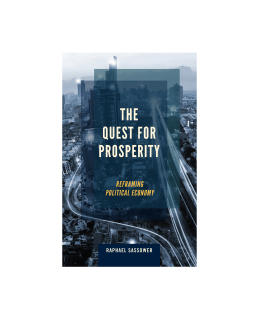
Additional Information
Book Details
Abstract
Envisioning a different mode of economic relations requires a rethinking of the classical frames of references we commonly take for granted. The implicit assumptions that we carry into critical debates are the stumbling blocks for finding useful solutions to age-old economic problems. And these impediments constrict our political imagination.
This book asks what are these frames of references? How many of them are worthy of retaining, while others might be discarded? And what new framings should be adopted in order to bring about a less crisis-prone and morally acceptable mode of human interaction?
Each chapter interrogates a different frame of reference, including culturally-embedded concepts of human nature, scarcity and abundance, markets, and the human condition. Examining their historical anchoring and the ways in which they have become confining for the realities of the postmodern world in which we currently live, it is shown that they have become so familiar that they are assumed rather than critically examined in most discussions of political economy.
Sassower weaves together strands of Marxism, Popperianism and postmodernism to offer an original, practical and hopeful approach to how we—citizens, thinkers and students—might enact collective prosperity. Such prosperity comes from our desire to improve the human condition. With singular clarity and directness, Sassower argues convincingly for new commitments —philosophical, social and political—in service to our collective flourishing.
James Collier, Associate Professor of Science and Technology, Virginia Tech
Raphael Sassower is Professor in the Department of Philosophy at the University of Colorado at Colorado Springs. He is author of The Price of Public Intellectuals (2014), Digital Exposure: Postmodern Postcapitalism (2013), Solo: Postmodern Explorations (2011) and Postcapitalism: Moving Beyond Ideology in Economic Crises (2009).
Raphael Sassower systematically analyzes the modern economic system: not just the systems that provide the mechanic function of capitalism but the very metric by which success and failure are measured. By interrogating the notion of “Prosperity” Sassower identifies and begins to fill a gap that emerges from employing established units of measure in an evolving economic context.
Michael Sawyer, Assistant Professor, Colorado College
Sassower’s study is excitingly elementary: it revitalizes the familiar basics of economics. The ideas of Adam Smith and of Karl Marx are still important and fresh, Sassower says, due to their firm root in the philosophies of their times. These he replaces with a new, critical philosophy, while retaining the basic quest of economic theory: abolishing hunger and creating abundance.
Joseph Agassi, Emeritus Professor, Tel-Aviv University and York University, Toronto
Table of Contents
| Section Title | Page | Action | Price |
|---|---|---|---|
| Contents | 7 | ||
| Foreword | 9 | ||
| Preface | 15 | ||
| Acknowledgments | 21 | ||
| Part I: Assumptions Underlying Theories | 23 | ||
| 1 Abundance/Scarcity | 25 | ||
| 2 The State of Nature and the Social Contract | 57 | ||
| 3 Human Nature and the Human Condition | 71 | ||
| 4 Individual versus Communal Property Rights | 89 | ||
| 5 Markets | 109 | ||
| 6 Economic Growth | 135 | ||
| Part II: Framing Theories | 149 | ||
| 7 Dangerous Assumptions | 151 | ||
| 8 Useful Assumptions | 161 | ||
| 9 Alternative Models and the Question of Scale | 171 | ||
| Part III: Current Models | 183 | ||
| 10 Contemporary Capitalisms and Their Faults | 185 | ||
| 11 The Perils of Globalization | 205 | ||
| 12 Remixing and the Knockoff Economy | 223 | ||
| 13 Marketing the Sharing Economy | 239 | ||
| Part IV: Reframing Political Economy | 259 | ||
| 14 Informative Case Studies | 263 | ||
| 15 Moral Framing of Political Economy | 291 | ||
| Epilogue | 323 | ||
| Bibliography | 333 | ||
| Index | 345 |
